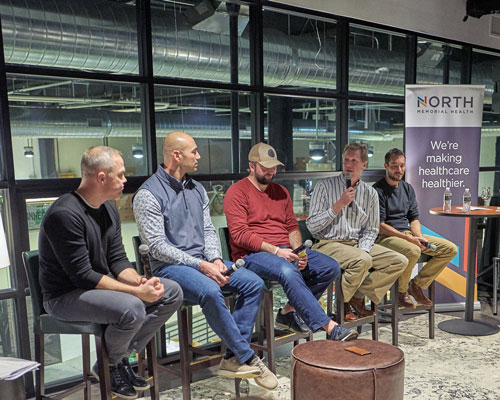Dr. Adam Van Dijk, is a North Memorial Health Clinic – Camden provider. He was also a panelist at our latest Healthmakers – Men’s Health event. We wanted to learn more, so we sat down with him and asked a few questions. Here’s what he had to say.
How can men be proactive about their health?
First I would say see their primary care provider at regular recommended intervals. Their doctor can address concerns, assess any risks he has, and then together the patient and provider can form an individualized plan to really optimize health going forward.
Generally, though, men often know what the right answer is to be healthy—which includes daily exercise, eat a healthy diet, wear a seat belt, quit bad habits like smoking or drinking too much—but they lack the specifics of how to do it, or the motivation to execute it, and then suddenly 20 years go by and they have collected a list of diagnoses along with a list of medications, and their quality of life is shrinking. The frustrating part is that many of these diagnoses are preventable or at least delay-able.
So, to be proactive, I recommend 90 percent of the time eating a plant-based diet–that means 50% of their plate over the day is vegetables and fruits, the remainder lean meats and whole grains, and avoid refined sugars/soda. By all means, celebrate with a piece of cake if it’s your birthday or anniversary, or the Vikings are in the Superbowl, but the other 95% of the time eat mainly plants. Men should also exercise 30 minutes or more (strength and cardio) around 5 days a week, wear a seatbelt in a car, and don’t smoke. This is not rocket science, but it takes practice and ongoing effort. Sure, they could juice, make protein drinks, fast, eat chia seeds, etc.—and those things are generally ok, but the biggest bang for their buck in terms of staying healthy now and preventing disease long term is eating primarily plants and getting their body moving.
Even if an individual considers themselves healthy, why should they still go see a doctor?
A physician is trained to not only treat you when you’re sick but also to identify and stratify you based on risk. That’s the power of seeing someone before you get sick—it is that they can help you avoid that sickness altogether, and people don’t always understand that diseases can be incredibly debilitating. There is also a huge range in a patient that comes in and says “I’m very healthy.” Even if someone is exceptionally healthy, your doctor can help you optimize your health so patients can feel their best. Also, seeing a patient over multiple visits gives Primary Care Providers (PCP) a sense of someone’s baseline, so that when they come in with a change in that baseline, we have a better sense of what is normal versus what is concerning.
What age should men consistently come in for preventive care check-ups?
We generally see men after they are sick—after they’ve put off symptoms and then something is out of control. But, generally, in their 20s to 30’s, men can see their PCP every 3 -5 years. This is a good time to optimize their body’s prime, and get a healthy diet and exercise regimen dialed in. Also, obesity, diabetes, and colon cancers are more prevalent now at younger ages, and checking in occasionally can help address any early concerns.
Rates of heart disease and cancers go up significantly in men’s 30’s and 40’s. Therefore, in their 30s to 40’s consider coming every 2-3 years. At 50, they should see their doctor annually. Of course, come anytime if you have any changes in your health you (or your spouse) are worried about.

What should men focus on at each age?
In 20s to mid-30s, the biggest cause of morbidity and mortality is accidents, so try not to be in an unsafe situation. This means wearing a helmet on a bike and a seatbelt in a car. This means avoiding binge drinking, riding with a drunk driver, recreational drug abuse, etc. It’s also a good time to nip any unhealthy habits in the bud, like smoking. Over time, smoking increases a person’s risk of a heart attack or stroke about two-fold. If you’re sexually active, think about STD screening and contraception—having kids is obviously not a medical problem, but it can rock your world, especially if you’re not expecting it. Stay up-to-date on vaccinations, and consider getting health insurance. Lastly, start the habit of eating primarily plants and establish a routine for physical activity.
In mid-30s to 40s, as we discussed focus on eating 50% plants and getting your body moving. This is when many men’s athleticism peaks, and then starts to descend, so establishing food and activity habits now is incredibly important. Physical activity also helps to ward off the aches and strains of being a weekend warrior on the flag football field or running around with kids. This age range is when your physician will want to check cholesterol, and he/she will pay attention to your blood pressure. Start paying attention to your body—that shoulder pain not going away could be a muscle strain, but could also be a rotator cuff tear that is going to lead to arthritis and difficulty combing your hair years down the road. Know your family history so we can screen you appropriately, and start considering your financial health as well—for example health insurance, retirement, getting out of high interest debt, etc.
50s – 70s: These are often the ages men start collecting diagnoses and prescription drugs (like hypertension, high cholesterol, coronary artery disease, etc). If someone is on medicine for these conditions: take the medicines! and see your PCP or specialists for recommended follow-up. If a patient wants to stop a medicine, then talk to your doctor about the risk/benefit of the medicine and alternatives. Recommit to lifestyle changes. Don’t give up on establishing healthy eating and activity habits. Men sometimes think it’s too late to change, but it makes an enormous difference in keeping a condition from getting worse, and preventing other new conditions from cropping up. Changing lifestyle habits can sometimes lower the amount and dosages of medications patients are prescribed.
What are some excuses you’ve heard from men on why they don’t go to the doctor? And what is your response to some of these excuses?

“I know my blood pressure is high, but I don’t really have hypertension”
“Whenever I go to the doctor they give me bad news”
“Why do you always try to take something fun away from me”
“I wouldn’t have come in, but my wife made me”
“I thought (insert symptom) would go away”
Seems many men don’t want to consider that they will decline or already are declining, despite all of humanity coming before them proving that their body will eventually fall apart and fail. Some men don’t like being told that the things they enjoy like smoking or drinking or eating bacon wrapped bacon for each meal is bad for them. If men are acutely sick, most of the excuses I hear are from a denial or dismissal that something is wrong. Some worry about losing control or being unable to perform in an important role, sometimes that is taking care of their family, going to work, bringing home a paycheck, etc.
My response to those who don’t come in for preventive visits is that the goal of a preventive visit is to prevent or delay some seriously debilitating diseases that can zap the quality out of living and shorten their lifespan. I try to give them their own personal data for risk, such as calculating their cardiovascular risk over 10 years. I try to give them also an analogy for the disease process we are discussing that they can relate to.
Has healthcare shifted to preventative care versus treating diseases?
I wish. On the whole, I think preventive care is the biggest bang for our health care dollar, but the focus of much of our medical advances, reimbursement structures, and often political discourse is on the tail end of disease, and by that time the patient is full blown sick and the cat is out of the bag. Then, we tell them they have type II diabetes, or coronary artery disease, provide multiple medications, and perform various procedures all with cost and additional risks. Because the risk factors (eg. obesity and hypertension) have been increasing, the burden of disease has increased. I recognize that when we discuss prevention with a patient, they leave the clinic into a world that promotes the opposite of what I suggest. Patients often work jobs that are stressful and sedentary. People choose quick, cheap, unhealthy food when they’re in a rush with work and kids and life, and lack the time or energy to carve out 30 minutes of physical activity a day. People relieve stress by smoking, drinking, and eating a carton of ice cream. Unfortunately, we will continue to treat all these diseases on the back end until the society shifts the focus to prevention with policy and cultural changes. That’s not an excuse for us as providers or patients, though, to sit back. Providers and patients continue to work hard every day to shift the focus to prevention.
Why not just go to urgent care or a quick clinic?
I think urgent cares and quick clinics are great in a pinch. But, if you have a primary clinic and are acutely sick, consider seeing your PCP because they know you—your risk factors, the nuances of your medical conditions and medications, and your baseline—what your lungs and heart sounded like, etc. and how that compares to this illness. At your PCP, the records of your vital signs, prior visits, diagnoses, labs are also readily available. If you see another provider at your PCP, your PCP’s colleagues can also communicate quickly with your PCP and often communicate with your specialists within the system quickly as well. This is the benefit of “continuity.”
We often hear complaints that people cannot make appointments with their PCP acutely or quickly. Sometimes if you contact your clinic and let them know you’re sick that day, they can facilitate an acute care visit appointment that day, or provide further instructions.
For more information on men’s health, please contact your primary care provider.

